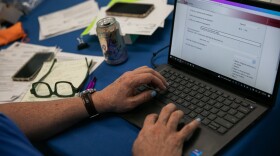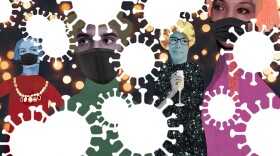
Maria Godoy
Maria Godoy is a senior science and health editor and correspondent with NPR News. Her reporting can be heard across NPR's news shows and podcasts. She is also one of the hosts of NPR's Life Kit.
Previously, Godoy hosted NPR's food vertical, The Salt, where she covered the food beat with a wide lens — investigating everything from the health effects of caffeine to the environmental and cultural impact of what we eat.
Under Godoy's leadership, The Salt was recognized as Publication of the Year in 2018 by the James Beard Foundation. With her colleagues on the food team, Godoy won the 2012 James Beard Award for best food blog. The Salt was also awarded first place in the blog category from the Association of Food Journalists in 2013, and it won a Gracie Award for Outstanding Blog from the Alliance for Women in Media Foundation in 2013.
Previously, Godoy oversaw political, national, and business coverage for NPR.org. Her work as part of NPR's reporting teams has been recognized with several awards, including two prestigious Alfred I. DuPont-Columbia University Silver Batons: one for coverage of the role of race in the 2008 presidential election, and another for a series about the sexual abuse of Native American women. The latter series was also awarded the Columbia Journalism School's Dart Award for excellence in reporting on trauma, and a Gracie Award.
In 2010, Godoy and her colleagues were awarded a Gracie Award for their work on a series exploring the science of spirituality. She was also part of a team that won the 2007 Nancy Dickerson Whitehead Award for Excellence in Reporting on Drug and Alcohol Issues.
Godoy was a 2008 Ethics fellow at the Poynter Institute. She joined NPR in 2003 as a digital news editor.
Born in Guatemala, Godoy now lives in the suburbs of Washington, DC, with her husband and two kids. She's a sucker for puns (and has won a couple of awards for her punning headlines).
-
For many people, the holidays mean more parties and more occasions to drink. But if you've noticed that one cocktail hits you harder than it used to, there's a scientific reason to explain it.
-
Mosquitos love heat. And as summers get warmer, mosquito-borne illnesses are rising, in the U.S., Europe, and South and Central America. Here are some tips to protect yourself.
-
With a pandemic-era rule expiring this month, people on Medicaid will have to re-qualify to keep their coverage. Language barriers, housing instability and computer literacy could stand in their way.
-
Boosting ventilation and filtration not only lowers the risk of transmission, it's also linked to higher test scores and better health. But making upgrades is more complex than it sounds.
-
The CDC says you can end isolation after five days. But emerging research shows with omicron, many people could be infectious for several days past that. So how do you determine if you're good to go?
-
A new study shows that getting the COVID vaccine during pregnancy confers significant protection to infants after birth.
-
To block a variant this transmissible, scientists say you need an N95 or other high-filtration mask. Here's how to find a good one and when to wear it.
-
You might want to cancel that holiday party, and definitely dust off your face mask. Don't panic, but do step up your precautions. Here's how.
-
The COVID vaccines haven't proved very effective for people living with organ transplants. But getting a third dose of the mRNA vaccines gave a big bump in antibody levels in a new study.
-
Can I get a massage? Travel with my unvaccinated kids? Eat indoors at a restaurant? Hit the gym? Experts weigh in with advice on 16 frequently asked post-vaccination questions.









